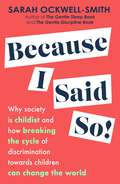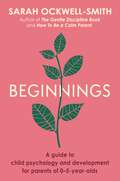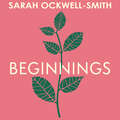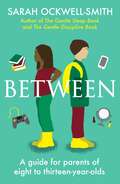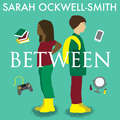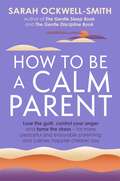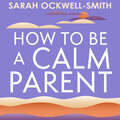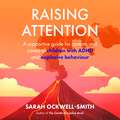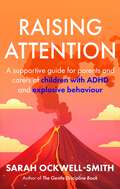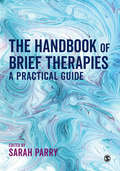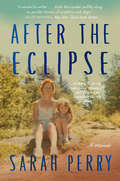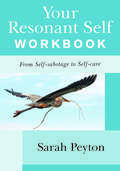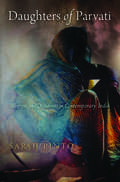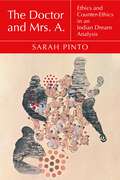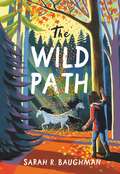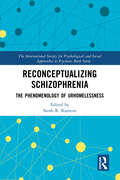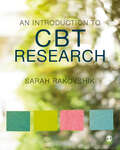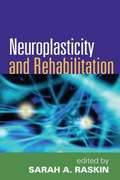- Table View
- List View
Because I Said So: Why society is childist and how breaking the cycle of discrimination towards children can change the world
by Sarah Ockwell-SmithSociety is making great strides in increasing awareness of oppression and injustice, but one group remains mistreated: children. Commonly recommended parenting and discipline methods treat children in ways that would cause uproar if adults were treated similarly. Children's needs and feelings are frequently dismissed and ignored by adults. Children are taught to blindly obey adults in the name of 'respect', although respect is so rarely shown to them. We are a society that is afraid of treating children kindly, as evidenced by the almost constant uproar and ridicule of the 'gentle parenting' movement. In this timely book, bestselling author and parenting expert Sarah Ockwell-Smith blends childcare history, sociology, psychology and current affairs to raise awareness of childism - the unconscious discrimination of children in our world - and why it impacts everybody. Essential for parents, carers, teachers and anybody who works with children, Because I Said So! is both a thought-provoking guide and an urgent call to action. It will help you to understand your own upbringing and how this has shaped your beliefs and behaviour; prompt you to consider the prevalence of childism in society today, so that you can change the way you look after the children in your care or reinforce the approach you are already taking; and consider how we can transform the way our society treats children to create positive, lasting change for generations to come. Childism is an issue that has been ignored and avoided for far too long. If we want to change the world for the better, we must start with treating our children better.
Because I Said So: Why society is childist and how breaking the cycle of discrimination towards children can change the world
by Sarah Ockwell-Smith'A vital read, not just for parents but anyone who values the next generation' Psychologies'A provocative new book which challenges every aspect of modern parenting' Daily MailSociety is making great strides in increasing awareness of oppression and injustice, but one group remains mistreated: children. Commonly recommended parenting and discipline methods treat children in ways that would cause uproar if adults were treated similarly. Children's needs and feelings are frequently dismissed and ignored by adults. Children are taught to blindly obey adults in the name of 'respect', although respect is so rarely shown to them. We are a society that is afraid of treating children kindly, as evidenced by the almost constant uproar and ridicule of the 'gentle parenting' movement. In this timely book, bestselling author and parenting expert Sarah Ockwell-Smith blends childcare history, sociology, psychology and current affairs to raise awareness of childism - the unconscious discrimination of children in our world - and why it impacts everybody. Essential for parents, carers, teachers and anybody who works with children, Because I Said So! is both a thought-provoking guide and an urgent call to action. It will help you to understand your own upbringing and how this has shaped your beliefs and behaviour; prompt you to consider the prevalence of childism in society today, so that you can change the way you look after the children in your care or reinforce the approach you are already taking; and consider how we can transform the way our society treats children to create positive, lasting change for generations to come. Childism is an issue that has been ignored and avoided for far too long. If we want to change the world for the better, we must start with treating our children better.
Beginnings: A Guide to Child Psychology and Development for Parents of 0–5-year-olds
by Sarah Ockwell-SmithPre-order Sarah Ockwell-Smith's essential guide to child psychology and development.BEGINNINGS is modern month-by-month reference guide for parents of 0-5-year-olds. It will answer all the questions that parents have about their baby, toddler and preschooler's physical and psychological development.Topics Covered: *How a baby grows and develops, month by month, during pregnancy *Physical development, month by month, in the newborn period *Brain development from birth to five years *How sleep develops and changes throughout the first five years *The development of self and personality *Social development, attachment and peer relationships *Temperaments and the development of emotion regulation *The development of memory *Current and classic theories in child psychology *Learning to sit, crawl, cruise and walk. *Language acquisition and early literacy skills *Early mark making - learning to draw and form letters *Schemas - how children learn about the world around them. *Food preferences and eating experiences in early childhood *Play - including suggestions for entertainment at each age *How parents and carers can encourage optimal brain development
Beginnings: A Guide to Child Psychology and Development for Parents of 0–5-year-olds
by Sarah Ockwell-SmithPre-order Sarah Ockwell-Smith's essential guide to child psychology and development.BEGINNINGS is modern month-by-month reference guide for parents of 0-5-year-olds. It will answer all the questions that parents have about their baby, toddler and preschooler's physical and psychological development.Topics Covered: *How a baby grows and develops, month by month, during pregnancy *Physical development, month by month, in the newborn period *Brain development from birth to five years *How sleep develops and changes throughout the first five years *The development of self and personality *Social development, attachment and peer relationships *Temperaments and the development of emotion regulation *The development of memory *Current and classic theories in child psychology *Learning to sit, crawl, cruise and walk. *Language acquisition and early literacy skills *Early mark making - learning to draw and form letters *Schemas - how children learn about the world around them. *Food preferences and eating experiences in early childhood *Play - including suggestions for entertainment at each age *How parents and carers can encourage optimal brain development
Beginnings: A Guide to Child Psychology and Development for Parents of 0–5-year-olds
by Sarah Ockwell-SmithPre-order Sarah Ockwell-Smith's essential guide to child psychology and development.BEGINNINGS is modern month-by-month reference guide for parents of 0-5-year-olds. It will answer all the questions that parents have about their baby, toddler and preschooler's physical and psychological development.Topics Covered: *How a baby grows and develops, month by month, during pregnancy *Physical development, month by month, in the newborn period *Brain development from birth to five years *How sleep develops and changes throughout the first five years *The development of self and personality *Social development, attachment and peer relationships *Temperaments and the development of emotion regulation *The development of memory *Current and classic theories in child psychology *Learning to sit, crawl, cruise and walk. *Language acquisition and early literacy skills *Early mark making - learning to draw and form letters *Schemas - how children learn about the world around them. *Food preferences and eating experiences in early childhood *Play - including suggestions for entertainment at each age *How parents and carers can encourage optimal brain development
Between: A guide for parents of eight to thirteen-year-olds
by Sarah Ockwell-Smith'Full of practical parenting advice that will give you the tools to guide your child through this time' Daily ExpressRaising a tween can often leave you feeling like a parenting beginner all over again. Children in the 'between' stage seem to change almost daily, leaving many parents struggling to understand the child they once thought they knew so well. In Between, parenting expert and mother of four Sarah Ockwell-Smith uses a unique blend of the biology, psychology and sociology of adolescence as the basis for practical parenting advice that you can use to help your child through the transition from childhood to adulthood.It explores key issues, including:*Why tweens can often be moody, rude, lazy and impulsive - and how to cope with their behaviour*What exactly happens during puberty - and when and how to talk to your tween about it* How to navigate friendships and romantic relationships in the tween years*How to encourage good mental health and body image*Managing screen time and avoiding common pitfalls*Supporting the transition to secondary schoolBetween also offers advice on coping with your own feelings as your child moves through this busy developmental period, and how to let go and give them wings to fly. The tween years can be a difficult period for parent and child alike, but your openness and support is key to building the relationship that you will have with your child for the rest of their life. Between is the handbook that will guide you across the bridge from childhood into adolescence, together with your child.
Between: A guide for parents of eight to thirteen-year-olds
by Sarah Ockwell-Smith'Full of practical parenting advice that will give you the tools to guide your child through this time' Daily ExpressRaising a tween can often leave you feeling like a parenting beginner all over again. Children in the 'between' stage seem to change almost daily, leaving many parents struggling to understand the child they once thought they knew so well. In Between, parenting expert and mother of four Sarah Ockwell-Smith uses a unique blend of the biology, psychology and sociology of adolescence as the basis for practical parenting advice that you can use to help your child through the transition from childhood to adulthood.It explores key issues, including:*Why tweens can often be moody, rude, lazy and impulsive - and how to cope with their behaviour*What exactly happens during puberty - and when and how to talk to your tween about it* How to navigate friendships and romantic relationships in the tween years*How to encourage good mental health and body image*Managing screen time and avoiding common pitfalls*Supporting the transition to secondary schoolBetween also offers advice on coping with your own feelings as your child moves through this busy developmental period, and how to let go and give them wings to fly. The tween years can be a difficult period for parent and child alike, but your openness and support is key to building the relationship that you will have with your child for the rest of their life. Between is the handbook that will guide you across the bridge from childhood into adolescence, together with your child.
Between: A guide for parents of eight to thirteen-year-olds
by Sarah Ockwell-Smith'Full of practical parenting advice that will give you the tools to guide your child through this time' Daily ExpressRaising a tween can often leave you feeling like a parenting beginner all over again. Children in the 'between' stage seem to change almost daily, leaving many parents struggling to understand the child they once thought they knew so well. In Between, parenting expert and mother of four Sarah Ockwell-Smith uses a unique blend of the biology, psychology and sociology of adolescence as the basis for practical parenting advice that you can use to help your child through the transition from childhood to adulthood.It explores key issues, including:*Why tweens can often be moody, rude, lazy and impulsive - and how to cope with their behaviour*What exactly happens during puberty - and when and how to talk to your tween about it* How to navigate friendships and romantic relationships in the tween years*How to encourage good mental health and body image*Managing screen time and avoiding common pitfalls*Supporting the transition to secondary schoolBetween also offers advice on coping with your own feelings as your child moves through this busy developmental period, and how to let go and give them wings to fly. The tween years can be a difficult period for parent and child alike, but your openness and support is key to building the relationship that you will have with your child for the rest of their life. Between is the handbook that will guide you across the bridge from childhood into adolescence, together with your child.
How to Be a Calm Parent: Lose the guilt, control your anger and tame the stress - for more peaceful and enjoyable parenting and calmer, happier children too
by Sarah Ockwell-SmithPre-order Sarah Ockwell-Smith's indispensable guide to more peaceful and enjoyable parenting'This isn't a parenting advice book, it's a book about you. The words you read in this book, however, will have a far greater impact on your children, than those contained in any parenting book you could read (and I count my own in that too).'How many times have you asked yourself 'what's wrong with me? Why can't I stay calm?'. So many of us would love to follow a gentler, more positive style of parenting, but we don't think we're cut out for it, because we aren't naturally calm. We feel that there is something wrong with us, that we're not good enough. We believe we are failing our children by not controlling our own emotions adequately.What we don't realise is that this describes almost every parent there ever was - and ever will be.In her trademark gentle, supportive and reassuring style, bestselling author Sarah Ockwell-Smith shows that while we all lose it at times, everyone can become a calmer parent. Based on her many years' experience working with parents, Sarah provides research, advice and practical exercises that will set you on the path to calmer parenting that will benefit both you and your child.Covering everything from the impact of your own upbringing on your parenting style to work and home life balance and letting go of the quest for perfection to ensuring your own basic needs are met, How to Be a Calm Parent is for any parent who knows that they need to be calmer to raise well adjusted, happy children, but struggles with their own emotions and stress levels.
How to Be a Calm Parent: Lose the guilt, control your anger and tame the stress - for more peaceful and enjoyable parenting and calmer, happier children too
by Sarah Ockwell-SmithAn indispensable guide to more peaceful and enjoyable parenting'This isn't a parenting advice book, it's a book about you. The words you read in this book, however, will have a far greater impact on your children, than those contained in any parenting book you could read (and I count my own in that too).'How many times have you asked yourself 'what's wrong with me? Why can't I stay calm?'. So many of us would love to follow a gentler, more positive style of parenting, but we don't think we're cut out for it, because we aren't naturally calm. We feel that there is something wrong with us, that we're not good enough. We believe we are failing our children by not controlling our own emotions adequately.What we don't realise is that this describes almost every parent there ever was - and ever will be.In her trademark gentle, supportive and reassuring style, bestselling author Sarah Ockwell-Smith shows that while we all lose it at times, everyone can become a calmer parent. Based on her many years' experience working with parents, Sarah provides research, advice and practical exercises that will set you on the path to calmer parenting that will benefit both you and your child.Covering everything from the impact of your own upbringing on your parenting style to work and home life balance and letting go of the quest for perfection to ensuring your own basic needs are met, How to Be a Calm Parent is for any parent who knows that they need to be calmer to raise well adjusted, happy children, but struggles with their own emotions and stress levels.
How to Be a Calm Parent: Lose the guilt, control your anger and tame the stress - for more peaceful and enjoyable parenting and calmer, happier children too
by Sarah Ockwell-SmithAn indispensable guide to more peaceful and enjoyable parenting'This isn't a parenting advice book, it's a book about you. The words you read in this book, however, will have a far greater impact on your children, than those contained in any parenting book you could read (and I count my own in that too).'How many times have you asked yourself 'what's wrong with me? Why can't I stay calm?'. So many of us would love to follow a gentler, more positive style of parenting, but we don't think we're cut out for it, because we aren't naturally calm. We feel that there is something wrong with us, that we're not good enough. We believe we are failing our children by not controlling our own emotions adequately.What we don't realise is that this describes almost every parent there ever was - and ever will be.In her trademark gentle, supportive and reassuring style, bestselling author Sarah Ockwell-Smith shows that while we all lose it at times, everyone can become a calmer parent. Based on her many years' experience working with parents, Sarah provides research, advice and practical exercises that will set you on the path to calmer parenting that will benefit both you and your child.Covering everything from the impact of your own upbringing on your parenting style to work and home life balance and letting go of the quest for perfection to ensuring your own basic needs are met, How to Be a Calm Parent is for any parent who knows that they need to be calmer to raise well adjusted, happy children, but struggles with their own emotions and stress levels.
Raising Attention: A supportive guide for parents and carers of children with ADHD and explosive behaviour
by Sarah Ockwell-SmithA book for anybody who has, or works with, children (of any age) with 'out of control' behaviour, including parents, teachers and healthcare professionals. Raising Attention busts commonly believed myths surrounding ADHD and 'naughty' children, discusses up to date neuroscience and genetics research in an accessible way and provides practical tips that really make a difference to both children and the adults who care for them.Written by bestselling childcare expert Sarah Ockwell-Smith, herself a mother of a young adult with ADHD, there are plenty of heartwarming and heartbreaking personal stories included to bring the book to life.If you've ever felt exhausted, helpless, guilty, embarrassed or shamed for your child's behaviour, this supportive and non-judgemental book is for you.
Raising Attention: A supportive guide for parents and carers of children with ADHD and explosive behaviour
by Sarah Ockwell-SmithA book for anybody who has, or works with, children (of any age) with 'out of control' behaviour, including parents, teachers and healthcare professionals. Raising Attention busts commonly believed myths surrounding ADHD and 'naughty' children, discusses up to date neuroscience and genetics research in an accessible way and provides practical tips that really make a difference to both children and the adults who care for them.Written by bestselling childcare expert Sarah Ockwell-Smith, herself a mother of a young adult with ADHD, there are plenty of heartwarming and heartbreaking personal stories included to bring the book to life.If you've ever felt exhausted, helpless, guilty, embarrassed or shamed for your child's behaviour, this supportive and non-judgemental book is for you.
Raising Attention: A supportive guide for parents and carers of children with ADHD and explosive behaviour
by Sarah Ockwell-SmithA book for anybody who has, or works with, children (of any age) with 'out of control' behaviour, including parents, teachers and healthcare professionals. Raising Attention busts commonly believed myths surrounding ADHD and 'naughty' children, discusses up to date neuroscience and genetics research in an accessible way and provides practical tips that really make a difference to both children and the adults who care for them.Written by bestselling childcare expert Sarah Ockwell-Smith, herself a mother of a young adult with ADHD, there are plenty of heartwarming and heartbreaking personal stories included to bring the book to life.If you've ever felt exhausted, helpless, guilty, embarrassed or shamed for your child's behaviour, this supportive and non-judgemental book is for you.
The Handbook of Brief Therapies: A practical guide
by Sarah ParryThis step-by-step guidebook offers a range of contemporary and popular brief treatments, suitable for a range of client groups and professional settings. Following a comprehensive introduction to the use of brief interventions in therapeutic practice, each chapter provides an introduction to the theoretical underpinnings and evidence-based brief intervention, followed by guidance on how to implement the approaches with useful ′top tips′, worksheets and examples from practice through case vignettes illustrating its application. The Handbook reflects current recommendations and guidelines of the National Institute for Health and Care Excellence and recommendations of accrediting professional bodies in the UK and US. A must have for any practitioner working to support the wellbeing of others.
After the Eclipse: A Mother's Murder, A Daughter's Search
by Sarah Perry"Stunning." —Entertainment Weekly | "Raw and perfect." —Laura Miller, Slate"Heartbreaking yet hopeful." —Samantha Irby, Marie Claire A fierce memoir of a mother’s murder, a daughter’s coming-of-age in the wake of immense loss, and her mission to know the woman who gave her life. When Sarah Perry was twelve, she saw a partial eclipse of the sun, an event she took as a sign of good fortune for her and her mother, Crystal. But that brief moment of darkness ultimately foreshadowed a much larger one: two days later, Crystal was murdered in their home in rural Maine, just a few feet from Sarah’s bedroom. The killer escaped unseen; it would take the police twelve years to find him, time in which Sarah grew into adulthood, struggling with abandonment, police interrogations, and the effort of rebuilding her life when so much had been lost. Through it all she would dream of the eventual trial, a conviction—all her questions finally answered. But after the trial, Sarah’s questions only grew. She wanted to understand her mother’s life, not just her final hours, and so she began a personal investigation, one that drew her back to Maine, taking her deep into the abiding darkness of a small American town. Told in searing prose, After the Eclipse is a luminous memoir of uncomfortable truth and terrible beauty, an exquisite memorial for a mother stolen from her daughter, and a blazingly successful attempt to cast light on her life once more.
Ibn Gabirol's Theology of Desire
by Sarah PessinDrawing on Arabic passages from Ibn Gabirol's original Fons Vitae text, and highlighting philosophical insights from his Hebrew poetry, Sarah Pessin develops a "Theology of Desire" at the heart of Ibn Gabirol's eleventh-century cosmo-ontology. She challenges centuries of received scholarship on his work, including his so-called Doctrine of Divine Will. Pessin rejects voluntarist readings of the Fons Vitae as opposing divine emanation. She also emphasizes Pseudo-Empedoclean notions of "Divine Desire" and "Grounding Element" alongside Ibn Gabirol's use of a particularly Neoplatonic method with apophatic (and what she terms "doubly apophatic") implications. In this way, Pessin reads claims about matter and God as insights about love, desire, and the receptive, dependent, and fragile nature of human being. Pessin reenvisions the entire spirit of Ibn Gabirol's philosophy, moving us from a set of doctrines to a fluid inquiry into the nature of God and human being - and the bond between God and human being in desire.
Your Resonant Self Workbook: From Self-sabotage To Self-care
by Sarah PeytonPractices for well-being, based in neuroscience and geared toward kindness. When we experience trauma or need to find a way to protect ourselves from interpersonal hurt, we make unconscious contracts with ourselves, such as: “I will never let myself get treated that way again” or “I will never forgive myself for that.” But these contracts often result in harmful behaviors like self-criticism, lack of trust, and procrastination. Until we recognize and free ourselves from these damaging contracts, we can never truly heal. Your Resonant Self Workbook: From Self-sabotage to Self-care takes us through the world of relational neuroscience and, using the lens of unconscious contracts, explores how our brains, nervous systems, and bodies react to the brains, nervous systems, and bodies of others. Case studies, resonant-language practice, questionnaires, meditations, and journaling provide readers with healing strategies for uncovering and rewriting these contracts. Following Your Resonant Self, this workbook provides the tools to turn inward with kindness, warmth, and curiosity and create opportunities for self-healing.
Daughters of Parvati: Women and Madness in Contemporary India (Contemporary Ethnography)
by Sarah PintoIn her role as devoted wife, the Hindu goddess Parvati is the divine embodiment of viraha, the agony of separation from one's beloved, a form of love that is also intense suffering. These contradictory emotions reflect the overlapping dissolutions of love, family, and mental health explored by Sarah Pinto in this visceral ethnography.Daughters of Parvati centers on the lives of women in different settings of psychiatric care in northern India, particularly the contrasting environments of a private mental health clinic and a wing of a government hospital. Through an anthropological consideration of modern medicine in a nonwestern setting, Pinto challenges the dominant framework for addressing crises such as long-term involuntary commitment, poor treatment in homes, scarcity of licensed practitioners, heavy use of pharmaceuticals, and the ways psychiatry may reproduce constraining social conditions. Inflected by the author's own experience of separation and single motherhood during her fieldwork, Daughters of Parvati urges us to think about the ways women bear the consequences of the vulnerabilities of love and family in their minds, bodies, and social worlds.
The Doctor and Mrs. A.: Ethics and Counter-Ethics in an Indian Dream Analysis (Thinking from Elsewhere)
by Sarah PintoJust before India’s independence, a young Punjabi woman, ill at ease in her marriage and eager for personal and national freedom, sat down with psychiatrist Dev Satya Nand for an experiment in his new method of dream analysis. The published analysis documents a surge of emotion and reflections on sexuality, gender, marriage, ambition, trauma, and art. “Mrs. A.” (as she is known) turned to female figures from Hindu myth to reimagine her social world and its ethical arrangements, envisioning a future beyond marriage, colonial rule, and gendered constraints.This book explores the conversation between Mrs. A. and Satya Nand, its window onto gender and sexuality in late colonial Indian society, and the ways Mrs. A. put ethics in motion, creating alternatives to ideals of belonging, recognition, and consciousness. It finds in Mrs. A.’s musings repertoires for the creative transformation of ideals and explores the possibilities of thinking with a dynamic concept of counter-ethics. An unconventional history of gender and sexuality in late colonialism, this book reminds us that the west did not invent feminism, that psychiatry’s history of innovation and creativity is global, and that ethical thinking does not need to center on western myths or paradigms.
The Wild Path
by Sarah R. BaughmanThe Line Tender meets The Secret Horses of Briar Hill in this hopeful, heartfelt story about one girl's search for legendary horses and her quest to piece her family back together.Twelve-year-old Claire Barton doesn't like the "flutter feeling" that fills her chest when she worries about the future, but she knows what she loves: the land that's been in her family for three generations; her best friend Maya; her family's horses, Sunny and Sam; and her older brother Andy. That's why, with Andy recently sent to rehab and her parents planning to sell the horses, Claire's world feels like it might flutter to pieces.When Claire learns about equine therapy, she imagines a less lonely future that keeps her family together, brother and horses included. But, when she finds what seem to be mysterious wild horses in the woods behind her house, she realizes she has a bit more company than she bargained for. With this new secret -- and a little bit of luck -- Claire will discover the beauty of change, the power of family, and the strength within herself.
Reconceptualizing Schizophrenia: The Phenomenology of Urhomelessness (The International Society for Psychological and Social Approaches to Psychosis Book Series)
by Sarah R. KamensThis volume presents a novel, international research study that reconceptualizes schizophrenia through an investigation of ways in which the first-hand experiences of those with a diagnosis differ from conventional diagnostic definitions. Offering insight into the history of psychiatric taxonomies in general and the invention of the schizophrenia diagnosis in particular, Reconceptualizing Schizophrenia maps the emergence of uncertainties about the empirical and conceptual status of contemporary diagnostic systems. Particular focus is given to the heterogeneity problem, or the problem of wide empirical variation within and between disorder categories. At the heart of this book are interviews with mental health service users with psychotic-disorder diagnoses in New York City and Jerusalem. Through a detailed portrait of their existential and socio-institutional worlds, the book unveils a way of being-in-the-world characterized by the experience of feeling profoundly vulnerable and unsafe in an inhospitable world as well as foreclosed from belonging to one or more human communities. As this psychological portrait of urhomelessness unfolds, the reader becomes slowly aware of the relationships between psychotic experiences – often thought to be bizarre or ‘un-understandable’ – and the timeless ways in which all humans seek to dwell in the world. Making an important contribution to the phenomenological-existential literature on psychosis, and demonstrating interdisciplinary and transcultural approaches to understanding anomalous experiences, this volume will be of great interest to researchers and scholars of transcultural psychiatry, clinical psychology, and critical theory.
An Introduction to CBT Research
by Sarah RakovshikThis highly practical book will guide students through the different levels of research within CBT by addressing the general principles of grappling with evidence and understanding statistics. It also highlights how to critically engage with, interpret and evaluate research so that it can be used to shape practice. This important book will help readers see the relevance of research in their working lives and empower them to become active and keen researchers.
An Introduction to CBT Research
by Sarah RakovshikThis highly practical book will guide students through the different levels of research within CBT by addressing the general principles of grappling with evidence and understanding statistics. It also highlights how to critically engage with, interpret and evaluate research so that it can be used to shape practice. This important book will help readers see the relevance of research in their working lives and empower them to become active and keen researchers.
Neuroplasticity and Rehabilitation
by Sarah RaskinBrain plasticity is the focus of a growing body of research with significant implications for neurorehabilitation. This state-of-the-art volume explores ways in which brain-injured individuals may be helped not only to compensate for their loss of cognitive abilities, but also possibly to restore those abilities. Expert contributors examine the extent to which damaged cortical regions can actually recover and resume previous functions, as well as how intact regions are recruited to take on tasks once mediated by the damaged region. Evidence-based rehabilitation approaches are reviewed for a range of impairments and clinical populations, including both children and adults.
